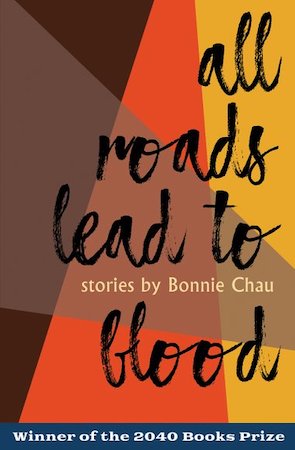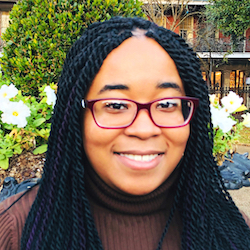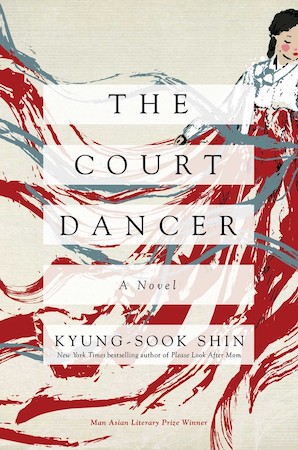As translated literature gains more and more (and even more still, we hope!) attention in the English-speaking book world, we’re thrilled to continue our interview series with literary translators. In this, we spoke to seven translators, some of whom have already delivered into English several intriguing and important contemporary works and others who are just beginning with debuts of all sorts.
Bonnie Chau: Mandarin Chinese and French to English
Born to a Francophile family of Chinese descent in California, Bonnie Chau visited Paris before she set foot in New York City. For a brief period of rebellion in high school, she signed up for Latin to differentiate herself—and lasted a week before returning to French. In addition to French, she translates from Mandarin Chinese. Her current, ongoing projects include short stories and internet fiction by the Chinese writer Anni Baobei from the 1990s (she’s written under other pen names since then) and a 1971 novella-in-dialogue, Le Taxi, by Violette Leduc. Chau published her own collection of short stories in English, All Roads Lead to Blood, and serves on the board of the American Literary Translators Association (ALTA).
Who does a language belong to: “The state of diversity in the translation world is pretty dire. It’s an inescapable fact, for example, that the bulk of Chinese literature in translation, over centuries, has been translated by white men, more specifically old white men in academia.
Being an Asian American from California translating from French honestly doesn’t feel that questionable to me, because French is so high up there in the hierarchy of languages, so, surely in our world of neocolonialism and imperialism, who wouldn’t aspire to learn and know and translate from French. I think my worries of legitimacy—were I to be really thinking of public or publishing opinion or criticism—would stem from feeling like I simply don’t know enough of the language, history, literature. But I do want to share something semi-related: when I was teaching in France, there was certainly questioning from my young students, who were very confused at the beginning of the school year to be learning English from an Asian person. People have a tendency to think about language as belonging to certain people, to certain bodies, to certain places, geographies, situations. We have all operated under these assumptions. Of course the siloing of languages is also connected to forming communities, creating safety; new languages have been developed out of necessity for these things. There are just a lot of power dynamics and structures in place to consider. It’s never neutral.”

Translating time in Mandarin: “Maybe the most accessible ‘quirk’ of Mandarin is that there are no verb tenses in the language, that time is indicated in different ways. I think this just is one thing that makes very clear how heavy is the hand of a translator, especially of someone translating between languages that are extremely different. When you read a text that’s been translated from Chinese into English where the verb tenses seem very standard and unnotable and clear-cut, the translator has very actively, intentionally done that work.
Something else came up recently in a story I’m translating, it was the phrase 求签. This issue is particular to Chinese, but definitely generally applicable to translation from many other languages too. 求签 is what’s usually referred to, or translated, as fortune sticks, or fortune-telling sticks. But there’s just so much orientalizing baggage there, and I think it’s really important to be thinking carefully about context in that way. In my translation as it stands now, I have it in the pinyin form (qiuqian), which is also somewhat strange, because it’s now a translation from Chinese characters not into English per se, but into a romanization.”
Paige Aniyah Morris: Korean to English

New Jersey native Paige Aniyah Morris translates from Korean to English from Incheon, South Korea. She has been working on Love at the Harbor, Kim Sehee’s debut novel. For a preview, check out an excerpt of the novel here in The Margins. In 2021, Morris’ publications have included a Kim Sehee short story in the summer issue of The Georgia Review and two chapbooks, including Seo Jangwon’s “Happy Together,” which charts a trans woman’s relationships in the wake of her transition. She’s also working on a book-length project of genre-queer collection of short stories under the mentorship of Anton Hur.
Learning Korean from blogs and YouTube: “I was in high school and had exhausted the whole foreign language curriculum, which was just two languages: Spanish and Latin. My history teacher had specialized in East Asian history and languages and suggested I try to learn Korean, probably thinking it would be hard enough to keep me sated for the rest of high school and possibly forever. He was right. I learned to read Hangul, the script, from random blogs and made crude little sentences with the help of YouTubers. I don’t know what it was about Korean, but studying it was one of the rare times I felt a sense of pure wonderment at learning something unattached to any end goal. When I found out there were actual Korean classes at my undergraduate university, I felt like the universe was giving me the green light to let myself get swept up in this language and everything that came with it. So I studied Korean formally for two years in college and have been very spottily self-taught since then. I wouldn’t say I’ve acquired it. I’m always learning it, every day.”

On being a Black American translator of Korean: “I personally haven’t yet encountered another Black American actively pursuing Korean literary translation despite many desperate shouts into the void, i.e., the Internet. But I want to believe there are more of us, and my dream is to form a community and possibly a pop-punk band or something with them someday.
I think being a Black American who translates from Korean into English has given me both an unusual perspective on the work and a ton of anxiety about it. My approach to translation is inevitably shaped by my own relationship to language, which I can’t separate from my Blackness. At almost every turn, I feel I’m much more likely to face suspicion and scrutiny rather than the grace and praise often afforded to non-Black translators. That, paired with my cautiousness around the very fraught act of translating from an often-colonized language into an incredibly colonial one, leads me to take extra care to get things right and honor the work. Language is so precious to me, and I think that absolutely has to do with constantly being made to feel shame about my own particular uses of it, which are inextricable from my Blackness and the Black literary tradition I write and exist in. So I am very careful when I translate now, maybe overly so, but I think that only serves to make the work stronger and all the more rewarding.”
Kareem James Abu-Zeid: Arabic, French, and German to English

Kareem James Abu-Zeid’s first language, English, came from his American mother, but he also grew up speaking Arabic with his Egyptian father, and learning it as a second language in schools in Kuwait until the age of eight. He speaks (and works in) French and German. In 2021, he translated the Palestinian poet Najwan Darwish’s Exhausted on the Cross. He has also translated the works of the contemporary stars of Arabic poetry, Iraqi-born Dunya Mikhail and Syria’s Adonis.
On the similarities between Quran recital and poetry: “It’s not exactly poetry, but I remember–as a child in Kuwait–hearing the Quran being recited on the radio, and also the call to prayer coming from the mosques. I used to sometimes go with my father to the mosque on Fridays, too. There’s a real musical quality to the Quran, and it has a lot of the same elements as poetry (frequent rhyme, and very strong rhythms), though the genre that seems to come closest to it is called saj‘, or rhymed prose–some of the pre-Islamic soothsayers (kuhhaan, plural of kaahin) recited their prophecies in that genre, though most of those ancient recitations were lost.”

How translating poetry keeps him humble: “There’s a real joy that is inherent in the creative act of translation itself, rather than in any recognition that the work may or may not receive in the future. Recognition and accolades are wonderful, of course, but they are not the goal. The ‘goal’ is to enjoy each moment of the process, and hopefully bring something new and beautiful into the world, something that impacts a few people positively, in some small way. Translating poetry keeps me humble, too. The truth is, even the most successful poetry translations are probably going to reach far fewer people than your average reality show on TV, so how much ego can you really have as a translator of poetry?”
Layla Benitez-James: Spanish to English

Layla Benitez-James is an Austin, Texas-born translator, poet, and editor based in Alicante, Spain. Her poems and translations have appeared in Poetry London, The London Magazine, Hinchas de Poesia, and elsewhere. Her chapbook God Suspected My Heart Was a Geode but He Had to Make Sure won the 2017 Cave Canem Toi Derricotte & Cornelius Eady Chapbook Prize was published by Jai-Alai Books. She’s currently working on a co-translation project with Lawrence Schimel, her “a kind of unofficial mentor,” of Hija del camino by Madrid writer Lucía Asué Mbomío Rubio.
Realizing that the Bible was translated text: “I remember this lightbulb going off when I really realized that the Bible was a translated text and that someone/a human was making decisions about writing these rules for people to live by. Before I did any formal translating myself, I wrote about this in terms of creative writing and how (following on from the Tower of Babel) translation was a transgressive and rebellious act against a God that wants to keep us apart from one another and without understanding.”

Translating problematic language: “There is much more casual, verbal racism in Spain. I’ve heard a lot of problematic language, but I’m also really really interested in this topic in terms of translation and spoke on a panel about translating racialized language for ALTA in October 2020, and then recently spoke on a panel about No es país para negras which has a lot of language used by a woman of color to highlight racist attitudes in her native Spain. I interviewed the playwright & actress Silvia Albert Sopale about her work, and she had some really interesting insight about how important it is to translate that language and not censor it (as it was in a German adaptation, but I also had the experience of reading one translation into English that I think was done by a white Spanish woman/non-native speaker and she went way overboard with some terms in my opinion, using the n-word where I don’t think that was at all the level of the original. That’s an unfolding story, I’m planning on reaching out to her to ask about her process and who read the draft before it went to publication, but I’m thinking about making a bid to retranslate the work.”
Chenxin Jiang: Mandarin Chinese, Italian, and German to English

Chenxin Jiang grew up bilingual in English and Chinese. A family move to Hong Kong meant that “Mandarin was rapidly eclipsed by Cantonese.” Her book-length literary translations include Volatile Texts: Us Two by Zsuzsanna Gahse, Tears of Salt: A Doctor’s Story by Pietro Bartolo & Lidia Tilotta, and The Cowshed: Memories of the Chinese Cultural Revolution by Ji Xianlin. Her current projects include the translations of works by Bian Zhilin, a Chinese poet of the 1930s, and the contemporary poets, the Hainan-based Jiang Hao and the Hong Kong-based Yau Ching.
Code-switching as a central part of the BIPOC experience: “I believe literary translation has the potential to become one of the most diverse, welcoming corners of the publishing world, because code-switching and existing in translation—whether between or within languages—is so central to the BIPOC experience and the experience of anyone who finds themselves on the margins, for any reason.”

On her multilingual grandmothers: “I was born in Singapore and grew up in Hong Kong. Both of these cities are translated places, as is evident in the etymology of their respective names. All of my grandparents were multilingual, having absorbed Malay and Japanese from their environments to the extent that was necessary for survival, and all spoke multiple Chinese topolects. I scarcely remember a time when I didn’t compare the differing versions of everything from the copy on milk cartons to a notice posted at the bus stop. I also grew up in the Anglican church, and religion, to my mind, inevitably entails learning to exist in a translational state in which the mysteries of one realm are brought to bear on the contradictions of another. I’ve always been translated and translating.”
Anton Hur: Korean to English

South Korea-based Anton Hur was born in Sweden to South Korean parents. Korean and English were his first languages, and today he “can survive in Mandarin and French.” As the translator of Kyung-Sook Shin’s The Court Dancer (look out for the imminent, tentatively-titled Violet) and Kang Kyeong-ae’s The Underground Village, Hur is one of the translators who’ve illuminated the stars of new Korean writing for English readers in recent years. IHis translation of Bora Chung’s genre-twisting collection, Cursed Bunny was published in July 2021. He is in the midst of translating Ocean Vuong’s Night Sky with Exit Wounds to Korean.
Serving as a childhood translator for his parents: “I translated for my parents as a kid because we were posted overseas for nine years of my childhood, but I don’t think they really needed it, certainly not my father who’s fluent in English to this day. They just wanted me to get used to expressing myself in both languages, I guess. Because we were not immigrants, it was always a given that we’d return to Korea, and they were very keen on my brother and me being perfectly bilingual. A lot of Korean parents back then thought speaking English well was an asset while Korean they could take or leave, but my parents knew it was the bilingualism that was the real asset, that English-speaking Koreans were a dime-a-dozen but Koreans who spoke both languages fluently were few and far between. They still are.”

Language as an instrument: “We all have language inside of us that’s waiting to come out and you have to be as quiet and still and open-minded as possible to hear it. I remember reading in The Mozart Season by Virginia Euwer-Wolff about a violinist who looks down at her violin and imagines all the beautiful music trapped in it, waiting to be played into life. I think translation is like that and life is like that. Your body is a conduit for some kind of energy the universe wants to express, whether it’s language or dance or scientific curiosity or wonder. You have to kind of tap into that and trust the process and take care of yourself, your instrument.”
Robin Myers: Spanish to English

New York-born, Mexico City-based poet and translator Robin Myers came to Spanish after a childhood of being fascinated by the life of her Mexican grandmother, who died long before she was born. She lived in Jerusalem after college and picked up conversational Palestinian Arabic. Of this third language, she says: “Every once in a while I’ll still have a brief, fragmentary dream in Arabic, and it makes me wistful both for what I’ve forgotten and for what I’d only just begun to learn.”
Highlights from her recent translations from Spanish are The Restless Dead by Cristina Rivera Garza; Cars on Fire, short stories by Mónica Ramón Ríos; and her translation of this unforgettable meditation, “All That is Man” in The Baffler by Ezequiel Zaidenwerg about the legacy of Diego Maradona.
Music as an act of translation: “An early act (of translation), if not the first, was learning to play an instrument. I started taking piano lessons as a child, and once I’d progressed enough to play music I really loved, I think I began to understand, or at least experience, the intimacy of interpretation. The practice of refracting yourself and your language (musical, verbal) in response to and in collaboration with something that already exists. You become an apprentice to it, enmeshed in it. As an experience, it keeps changing all the time. Maybe that’s why I’ve never understood, in music, the hierarchy that puts ‘original’ compositions on top and covers below.”
The physicality of language: “When I ‘discovered’ poetry in my teens, it was a revelation to me: that language could do so much with so little, could take so many liberties, could break so many ‘rules,’ could be so freeing and so free.
What’s true across the board, though—in writing poetry, translating poetry, and translating prose—is that these are all practices that really force you to plunge your hands into language as a physical, material thing. As both a poet and a translator across genres, I’m always thinking about rhythm and sound. What is it that these words do together? What are their textures like? Where do they clash or strain or flatten or soothe? What decisions can I make, on the level of language, for them to have a different effect on the reader’s ear and mind and expectations? Reading and writing poetry has taught me to enjoy—and prioritize, and believe in—the plasticity of language in any genre.”
The post 7 Emerging Literary Translators Whose Work You Should Read appeared first on Electric Literature.
Source : 7 Emerging Literary Translators Whose Work You Should Read







